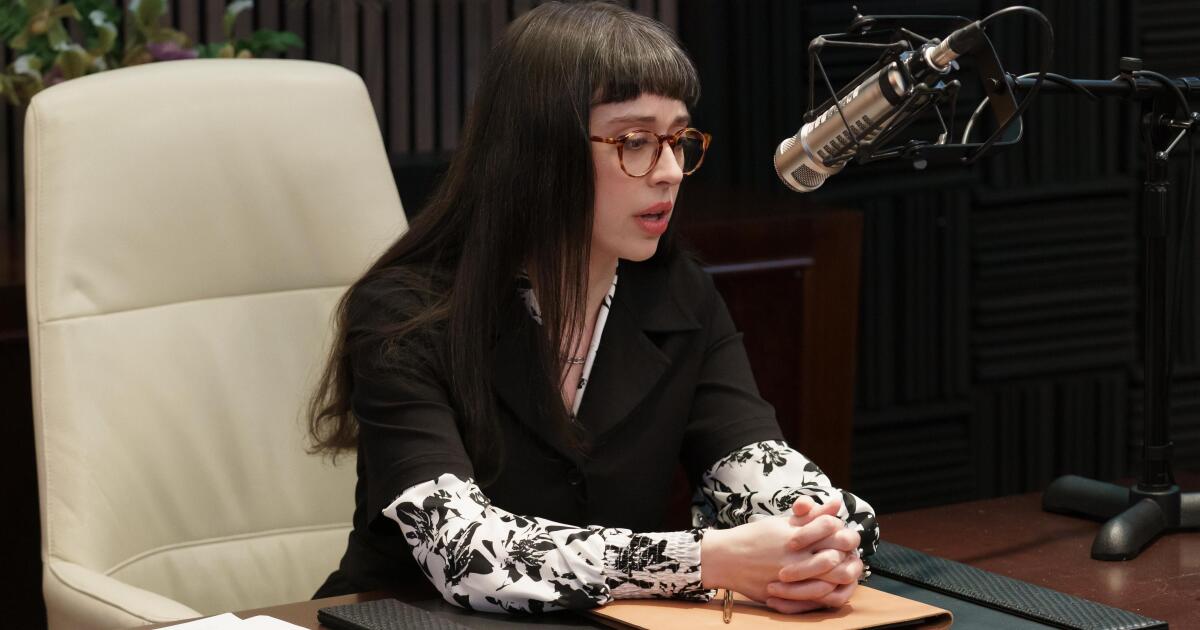The Rise of the “Morally Questionable Podcaster” in Pop Culture
One of the most popular shows of this summer focuses on a gooey true-crime podcaster. Only murders in the buildingon Hulu, follows three fans of a Serial-as show called All is not OK in Oklahoma. By the end of season two, it becomes clear that the show’s host, played by Tina Fey, might be a cold-blooded murderer herself.
“I need something with famous people, and blood!” she shouts to an assistant. “God, I need a murder. A voucher !
Fey’s character is just one example of what appears to be a new pop culture archetype.
Call them the morally dubious podcasters.
In the movie RevengeBJ Novak plays a selfish journalist who starts a podcast about the death of a woman he briefly dated.
Another morally questionable podcaster sneaks into a crime scene (and a cop’s bed) on the Showtime series Dexter: new blood. And in the ironic social comedy Rutherford Falls on Peacock, not one but two morally questionable podcasters go wild, including an NPR reporter who destroys the life of one of the main characters.
“Ah yes, the morally dubious podcaster,” laughs Nicholas Quah. He covers podcasts for Vulture and New York Magazine and recognized the archetype immediately. “My favorites are the first ones I noticed: True Crime Podcasters of 2018 Halloweenwho – spoilers – ends up being brutally killed for chasing Michael Myers.”
But Quah remembered an even older example – from the 2014 Kevin Smith film Defense — and says there’s a reason TV and movies serve so many morally questionable podcasters in their quest for fame and notoriety. This reason would be real life.
“Look up and down apple podcast charts“, points out Quah. “You will find a number of frankly morally dubious real crime shows. People who, in some cases, plagiarize other people’s stories, accessorizing them and spreading incomplete facts and inconsistent truths. ”
Quah wrote about these issues with Addicted to crime, one of the most popular podcasts in the country. And of course the New York Times‘ podcast, Caliphate, had to be essentially retracted in 2020 when its sensational main subject, who claimed to be a member of ISIS, turned out to be a serial liar.
But morally dubious podcasters go beyond the true-crime genre. The Peacock Show, Rutherford Falls, features a smarmy, racist podcaster who imagines himself, as he puts it, “in the tradition of Plato, Nietzsche, and my personal podcasting hero, Mr. Joseph Rogen.”
This character embodies what NPR pop culture podcaster Linda Holmes calls “yelping and slapping”. People ringing into a microphone in their basement and posting the results on the internet remind her, she says, of the early days of blogging.
“You can start a podcast tomorrow with very little material,” she observes. “Just like you could go on the internet and start a blog. And what you get from that is a lot of people who are really good and really professional and some celebrities who see it as an easy way to expand their brand and control their own publicity.You have talented people who have not been welcomed into traditional media spaces.
But you also have scammers, she adds, opportunists and people who “don’t follow the rules you would like them to follow”. To some extent, the morally dubious podcaster is the latest version of a classic figure – the stranger in town. It is an exhibition device, a way of framing a story.
But now, when many polls show that trust in the media is collapsing, the morally dubious podcaster has a special power. You don’t know why she’s here. Or what she can extract from your truth.
Copyright 2022 NPR. To learn more, visit https://www.npr.org.


Comments are closed.